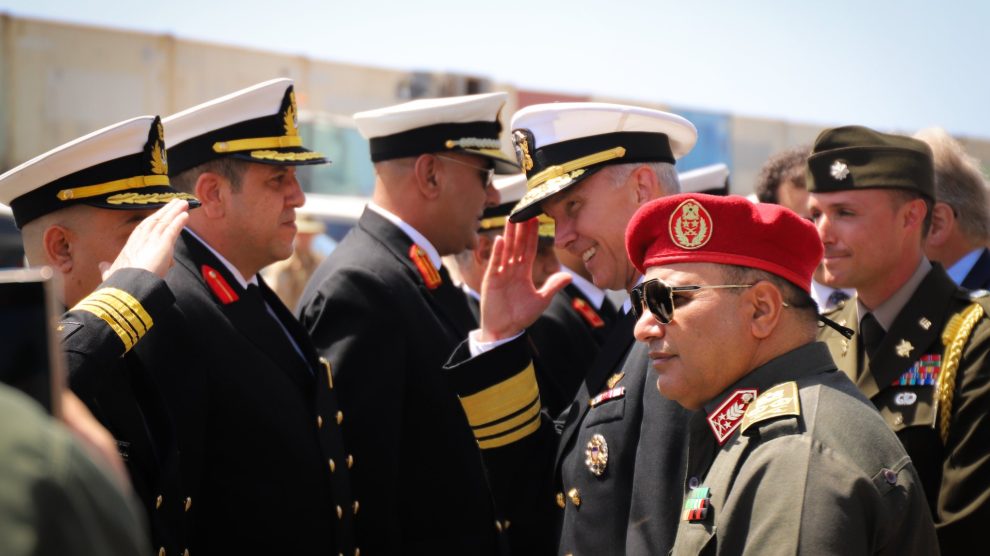Decoding the news. Senior U.S. officials—including Vice Admiral J.T. Anderson (Commander of the 6th Fleet), U.S. Special Envoy for Libya Richard Norland, and Chargé d’Affaires Jeremy Berndt—are meeting with Libyan political and military leaders on both sides of the country’s divide.
- These meetings signal Washington’s renewed push to stabilise Libya, with a clear objective: countering Russia’s expanding military footprint in the region.
- This could be an inflexion point for Italy—turning a long-frozen front into a new strategic opportunity.
The Mount Whitney in the Med. Following its stop in Tunisia, the USS Mount Whitney, a Blue Ridge-class amphibious command ship, is docked in Tripoli and Benghazi in the last two days.
- The US Navy asset is hosting meetings aimed at strengthening military ties and promoting national security integration.
- The participants discussed enhancing U.S.-Libya military cooperation and U.S. support for Libyan efforts to reunify its military forces.
- “The United States is dedicated to partnering with Libyan leaders throughout the country and across political, economic, and security domains to achieve lasting peace and unity,” stated the U.S. Embassy to Libya.
Why it matters for Italy. Rome has long viewed Libya as part of its extended security perimeter. The renewed American presence offers three strategic dividends:
- Energy security: Italy’s ENI remains a key operator in Libya’s oil and gas sector. U.S. support for stability lowers operational risk.
- Migration deterrence: As Defense Minister Guido Crosetto has warned, irregular flows are being weaponised in hybrid operations—including by Russian-backed actors. U.S. involvement helps mitigate this threat.
- Geopolitical reach: A stronger Western posture in Libya complements Italy’s ambitions in the Mediterranean and North Africa, as outlined in the Mattei Plan for Africa.
A pragmatic approach. Despite the controversial record of eastern Libyan commander Khalifa Haftar—who maintains longstanding ties with Russia—Washington sees him as a potential bulwark against terrorism and Russian influence.
- While this engagement is politically complex, it reflects the pragmatic calculation: given that all major Russian military assets in Libya are based in the Haftar-controlled territory of Cyrenaica, any serious effort to degrade Moscow’s footprint requires some form of dialogue with his family network.
- This approach aligns with key takeaways from a May 2024 policy paper published on NATO’s website—part of a broader reflection on the Alliance’s southern engagement.
- The paper, authored by leading experts, suggests that cooperation with “non-accountable” partners may be necessary in fragile environments to achieve shared security goals.
Expert’s take. Federica Saini Fasanotti, senior associate fellow at ISPI, sees the visit of the USS Mount Whitney as “the most significant U.S. naval presence in Libyan ports during peacetime in over fifty years.” The involvement of the Sixth Fleet’s commander, she notes in a conversation with Decode39, underscores the operation’s strategic importance.
- She connects the move to a broader U.S. repositioning, in line with recent intelligence hearings focusing on Russian and Chinese influence in Africa.
- “Russia, having lost key bases in Syria, is now doubling down on Libya’s ports and military infrastructure—and the U.S. is trying to block that.”
- “Beijing is expanding its footprint, even through private security actors, including in Libya,” she adds.
- This, she argues, reinforces the need for a sustained U.S. presence on the continent.The reshaping of U.S. deployments in Africa, according to Saini Fasanotti, reflects Washington’s effort to recover ground after the loss of a crucial outpost, such as Agadez in Niger, in 2024.
- “The U.S. is now more engaged in Chad, and paying close attention to Senegal, Nigeria, and Kenya. Libya—just across from Italy—is too strategic to neglect.”
What we’re watching. The U.S. is back in Libya, and Italy should see it as a tailwind.
- By leveraging Washington’s renewed attention, Rome can reassert its leadership role—and help anchor Libya’s fragile situation in a shared Euro-Atlantic framework.
- Italy actively supports Libya’s economic recovery, as seen in events like the 51st Tripoli International Fair inaugurated this week, which aims to foster trade and cultural exchange.
- But without improved security conditions— increasingly threatened by low-intensity Russian destabilisation tactics—such efforts risk becoming ineffective and counterproductive.
(Photo: X, @USEmbassyLibya)





